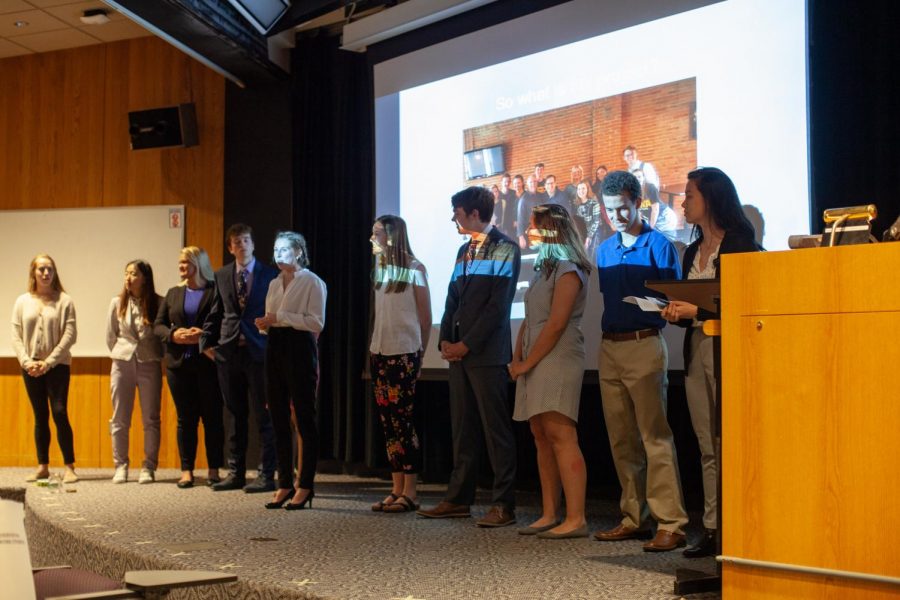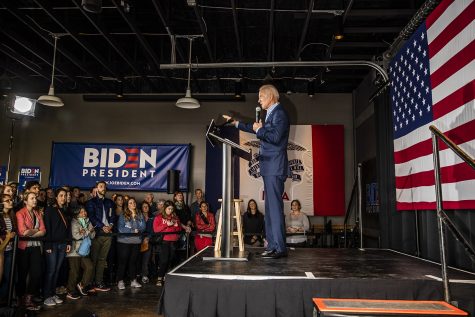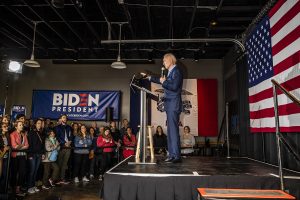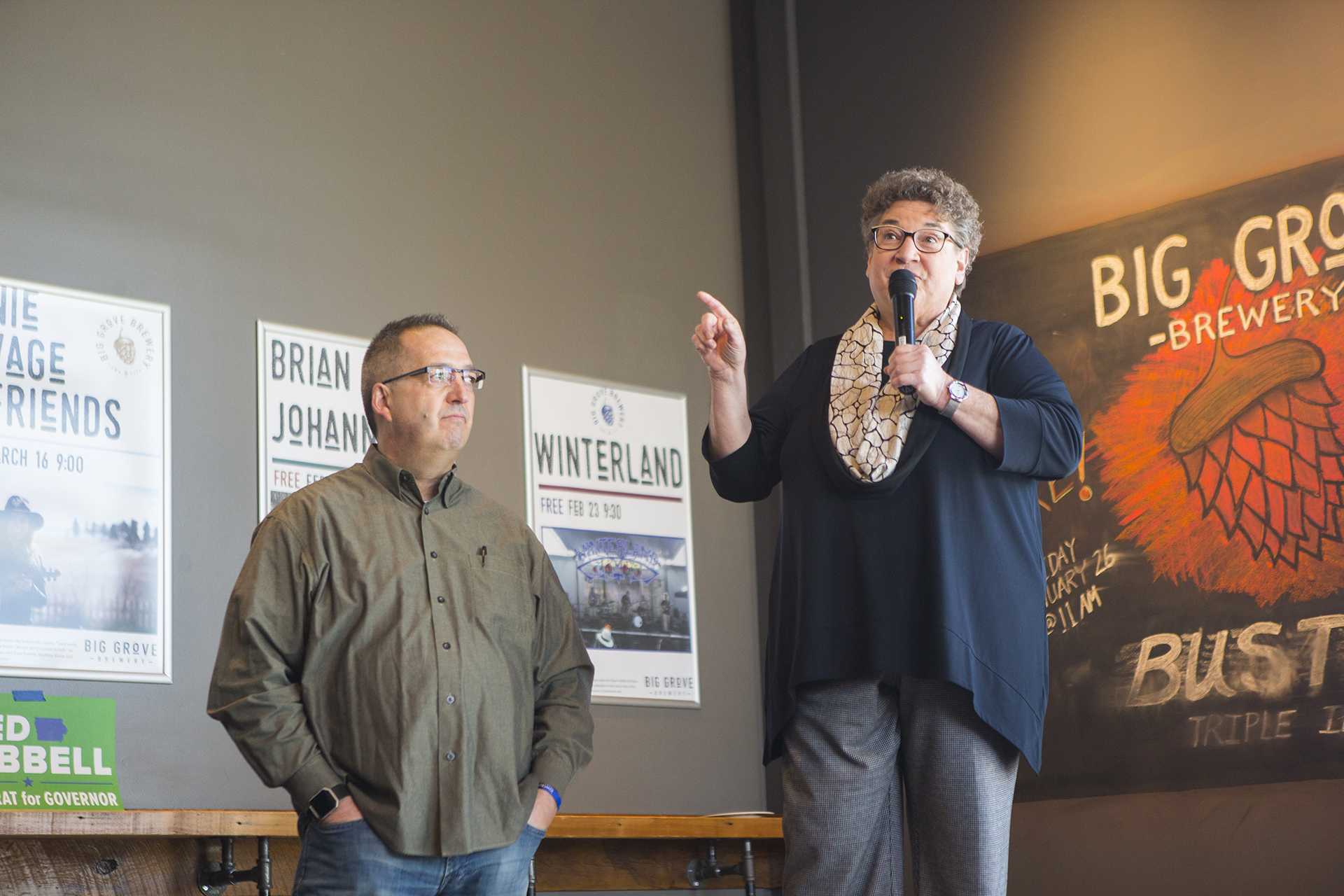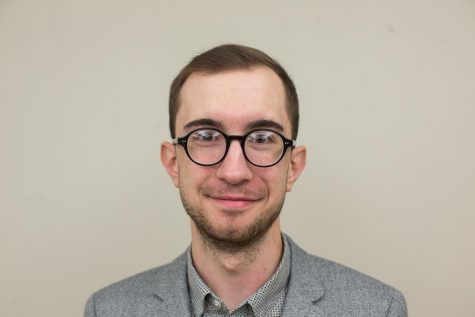Engaged social innovation projects showcase students’ concerns
Now in its fourth year, the Fieldwork in Social Innovation course allows students to explore issues facing the campus, city, and world.
The 13 students of the Fieldwork in Social Innovation class present their ideas to change-makers from across Iowa City on Wednesday, May 1. The class, which is in its fourth year, is housed in the Honors Program and allows students to explore problems “that keep them up at night,” Instructor Dave Gould said.
May 1, 2019
Sexual assault, mental health, environmental consciousness, and social equity – these are the problems that keep the 13 honors students of the Fieldwork in Social Innovation course up at night.
The course, which is housed in the Honors Program and taught by Dave Gould, is in its fourth year – but the format of the students’ presentations changed for the spring 2019 semester; gathered in the Becker Communication Building Wednesday evening, 10 ideas were presented to campus, city, and business professionals including University of Iowa President Bruce Harreld, state Sen. Joe Bolkcom, D-Iowa City, and Yotopia owner Veronica Tessler.
“I’ve done this for four years and have never done it the same way twice,” Gould said. “There is this mentality that young people, especially students, are idealistic and their ideas are just that – ideas. It is easy to pat a student on the back and say, ‘good job,’ but how do those ideas move forward and become operational?”
It was with that goal of operationalization in mind that Gould, along with teaching assistants Shawnee Molck and Allexis Mahanna, decided on the format for Wednesday’s colloquium. The 30 professionals gathered were encouraged to place their business cards in mason jars corresponding to ideas that spoke to them the most.
One idea, “Answering the Call for Help,” was presented by UI student John Lyons. With tears in the eyes of attendees, Lyons shared the story of his best friend who was raped as a freshman and left the university as a result.
His proposal was simple: during syllabus week, classes tend to end five to 10 minutes early. During that extra time, as opposed to simply sharing the “boilerplate language outlining university sexual assault policy,” is to share a video letting survivors of sexual assault know that they are not alone.
“This is an epidemic,” Lyons said. “One that is engrained in our college culture. So how do we start shifting that culture? That is what I asked myself when I first joined the fieldwork class. I thought that there must be some way for a message of support to reach every student, every semester, consistently.”
It is ideas like “Answering the Call for Help,” Gould said, that create the type of learning environment that should be replicated across the university.
“[Sexual assault] on college campuses is an epidemic, and one that this generation knows all too well,” Gould said. “I’ll never forget a conversation that I had with President Harreld where he said, ‘my greatest concern is not the world our students will inherit, but if higher education is preparing those students for the world.’ That, to me, is one of the most important aspects of this class.”
Another problem faced by college students every day is mental illness, UI students Katy Misel and Weiqi Wang said in their presentation entitled “Hawk Dogs.” Their proposal is to create a first-in-the-nation certified program for therapy dogs to hold their own “office hours” where students can visit and alleviate stress and depressive symptoms.
A survey conducted by Misel and Wang stated that over 80 percent of respondents believed therapy animals are effective in managing things every student deals with, such as exams and relationship-based issues.
But not every presentation was geared solely towards the UI student body – “Redeeming Re-entry,” for example, focuses on the rehabilitation of incarcerated Iowans at Oakdale Prison.
The program, presented by John Paul Cacioppo, gathers hundreds of books and brings them to Oakdale. With a chuckle, Cacioppo explained that he even visited the prison on his birthday to interview inmates about which books they would like to see the most. Even though a small gesture, he added, it helps to establish a caring and air of rehabilitation not often seen in the American prison system.
“What I found was boy did they want books,” Cacioppo said. “Whether it was for academic resource or for classes they take through this university or recreation … I invite you all not to cling onto the misconception that I held onto before I visited the prison, these people aren’t just shadows, they are people you see every day.”
As the presentations came to a close, Gould looked onto the students with a palpable sense of pride – but to Mahanna, Wednesday’s event was only the first step in addressing the ‘concerns of an anxious world.’
“The way we have to look at it is this: this is the world we have, this is the world we want. Now how do we practically go about inciting that change?”



